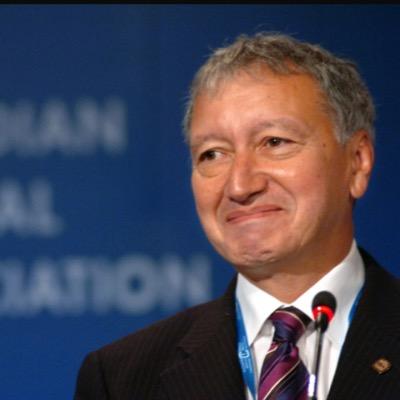
A new Day for the CMA
Aug 24, 2006
National Post
By David Gratzer
Dr. Brian Day has gone from Liverpool socialist to accomplished orthopedic surgeon to Vancouver medical entrepreneur. Delegates at the Canadian Medical Association's annual meeting in Prince Edward Island elevated him to a new role this week: president. With this vote, doctors pushed Canadian medicare one step closer to sanity.

Brian Day receives CMA president-elect. |
Of course, not everyone sees it this way. No sooner had the vote been announced than Dr. Ruth Collins-Nakai, the outgoing president, suggested that "it's not necessarily a shift in ideology." Dr. Hedy Fry, a former Liberal cabinet minister, explained that Dr. Day must now work to represent all physicians. And, in a small way, they have a point: Dr. Day's victory should be kept in perspective. He was elected by a fraction of the nation's physicians to a job heavy on travel and meetings, light on public prognostication. At this point, he actually isn't even the president of the CMA -- rather, he's president-elect, with a full year before he ascends to the top job.
And yet, it is impossible not to feel the significance of the moment. Dr. Day is not simply a critic of Canada's health care system, he is arguably the most vocal and articulate one. He told The New York Times in an interview, "This is a country in which dogs can get a hip replacement in under a week and in which humans can wait two to three years." He has not simply suggested alternatives to the status quo but, literally, built one, in the form of his private surgery centre. Several years ago, he went so far as to offer to take over the majority of surgeries of the local regional health board for 60% of its present cost. (The NDP government at the time bristled.)
Even Dr. Fry acknowledged that the vote represented a changing of the guard. For a decade, the Canadian Medical Association removed itself from the weighty debate of health care reform. With this vote, the nation's physicians sent a simple and clear message: There's a fundamental problem with medicare.
Dr. Day, in some ways, is an unusual messenger. He grew up in a socialist home in Liverpool; both of his parents voted Labour. He claims that in his first 15 years of practicing medicine, he had strongly supported a government-run system. His enthusiasm waned: "When you find that your operating-room time is cut from 22 hours a week progressively over the years to five hours a week," he told CBC Radio, "and you have 450 patients waiting for health care, you realize that something has to give." Today, Dr. Day operates the largest private clinic in the country, providing a host of surgical procedures on a for-profit basis. His views on health care have made national and international news.
He takes over an organization that has been anything but front and centre in this debate. In recent years, the Canadian Medical Association avoided controversy. In 1996, when members debated private care, supporters of the status quo won the day. The close vote was tipped by the passionate speech of Dr. Jack Armstrong, then president, who argued that if the CMA "is the first out of the trenches for private funding for core medical services, we are going to get shot down in flames."
And so, for much of the last decade, the CMA ignored the 800-pound gorilla in the corner. Waiting lists grew, patients suffered -- and the CMA made motherhood-and-apple-pie statements about the importance of access. Even meetings were carefully organized to emphasize the CMA's non-controversial nature. After the publication of my first book (which was critical of medicare), for instance, I received an invite to speak at the annual meeting; I found myself on a panel discussion with eight other people -- all opposed to my view.
But the CMA has emerged from its self-imposed exile. Last year, delegates at the annual meeting endorsed a motion calling for private options if patients can't get timely care in the public system. This year, they went further.
With a rotating presidency system, it was British Columbia's turn to put forward a candidate. The British Columbia Medical Association had an election, with Dr. Brian Day the victor. He beat out, among others, Dr. Jack Burak. Before the vote, Drs. Day and Burak had agreed to honour the result, and support the winning candidate. After losing in British Columbia, Dr. Burak broke his word and ran for CMA president anyway. His candidacy attracted the endorsements of former presidents and a host of medicare defenders. This week, Dr. Burak lost, again.
How to understand the election? For four decades, Canadian health policy has been dominated by one dominant ideology; its proponents were confident that no matter the problem, there is a government solution. Former Saskatchewan premier Roy Romanow well articulated this position in the final report of his royal commission, stating that government-run health care is not simply the fairest but also the most "efficient" system. Dr. Day's election is the recognition by Canadian physicians that this ideology is a failure. Dr. Day isn't suggesting that the entire system be privatized, as his most zealous critics have charged. He simply recognizes that there is a role for a vibrant private sector in health care -- as there is in the other nine-tenths of the economy.
Dr. Day's election is the second significant event to rock the medicare status quo. Last June, the Supreme Court of Canada -- arguably the most liberal high court in the Western world, having endorsed the constitutionality of medical marijuana and gay marriage -- ruled against Quebec's ban on private insurance. Chief Justice Beverly McLachlin and Justice John Major wrote: "Access to waiting lists is not access to health care."
The full legal implications of the Supreme Court ruling remain to be seen. Indeed, with the interpretation of the Quebec government, it's unclear if private insurance will be legalized. A Day presidency is also unlikely to result in any dramatic legal upheavals (like, say, the Ontario Medical Association's challenge to the Canada Health Act in the 1980s). But both the ruling and the election will change public opinion. In a country where politicians are content to mouth platitudes about timely care and promise meaningless guarantees, it's significant that prominent Canadians no longer accept the status quo.
Earlier this year, Dr. Day told The New York Times, "In a free and democratic society where you can spend money on gambling and alcohol and tobacco, the state has no business preventing you and me from spending our own money on health care." Those are strong words. And remember, they come from the president-elect of a physicians' association, 63,000 strong.
David Gratzer, a physician, is the author of The Cure, forthcoming from Encounter Books.




